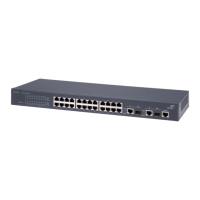2-24
z After sending a DHCP-ACK packet with the IP configuration parameters to the DHCP client, the
DHCP server sends an Accounting START packet to a specified RADIUS server. The RADIUS
server processes the packet, makes a record, and sends a response to the DHCP server.
z Once releasing a lease, the DHCP server sends an Accounting STOP packet to the RADIUS
server. The RADIUS server processes the packet, stops the recording for the DHCP client, and
sends a response to the DHCP server. A lease can be released for the reasons such as lease
expiration, a release request received from the DHCP client, a manual release operation, an
address pool removal operation.
If the RADIUS server of the specified domain is unreachable, the DHCP server sends up to three
Accounting START packets (including the first sending attempt) at regular intervals. If the three packets
bring no response from the RADIUS server, the DHCP server does not send Accounting START
packets any more.
DHCP Accounting Configuration
Prerequisites
Before configuring DHCP accounting, make sure that:
z The DHCP server is configured and operates properly. Address pools and lease time are
configured.
z DHCP clients are configured and DHCP service is enabled.
z The network operates properly.
Configuring DHCP Accounting
Follow these steps to configure DHCP accounting:
To do… Use the command… Remarks
Enter system view
system-view
—
Enter address pool view
dhcp server ip-pool
pool-name
Required
Enable DHCP accounting
accounting domain
domain-name
Required
The domain identified by the
domain-name argument can be
created by using the domain
command.
Enabling the DHCP Server to Process Option 82
If a DHCP server is enabled to process Option 82, after the DHCP server receives packets containing
Option 82, the DHCP server adds Option 82 into the responses when assigning IP addresses and other
configuration information to the clients.

